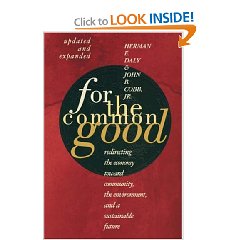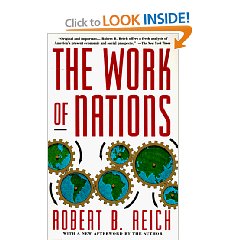Dr. Herman E. Daly may well be a future Nobel Prize winner …he is especially well-regarded in Norway and Sweden, where he has received prizes one step short of the Nobel. He is the author, co-author, or primary contributing editor of many books that fully integrate the disciplines of economics and ecology. I bought the three most recent for the purpose of selecting one to give out at my annual Global Information Forum. I ended up choosing For the Common Good: Redirecting the Economy toward Community, the Environment, and a Sustainable Future, in part because it is available in paperback and is not a more expensive “trade” publication; and in part because it is strong in laying out specific ecological policy areas in the context of a strong theological or ethical perspective. More on that in its own review.
Of the three books (the third one that I reviewed is Valuing the Earth: Economics, Ecology, Ethics) this, the text-book, is assuredly the most up-to-date and the most detailed. If you are buying only one book for yourself, this is the one that I recommend, because these are important issues and a detailed understanding is required with the level of detail that this book provided. It should, ideally, be read with “Valuing the Earth” first (see my separate review of that book, from the 1970's updated with 1990's material and new contributions), then “For the Common Good”, and finally the text book as a capstone. But if you buy only one, buy this one.
Tables of contents rarely do justice to the contents but in this case, they excel. This is one of the most intelligent, structured, useful outlines it has been my privilege to examine. Read the Table of Contents information provided by the publisher to satisfy yourself. From Part I with three chapters (An Introduction to Ecological Economics) to Part II with 4 chapters (The Containing and Sustaining Ecosystem: The Whole) to Parts III and IV (Microeconomics and Macroeconomics, respectively, five and four chapters each) to Part V with four chapters (International Trade), and finally to Part VI (Policy) with chapters on General Policy Design Principles, on Sustainable Scale, on Just Distribution, and on Efficient Allocation, the content of the book is elegantly organized and accurately described.
Readings and other references make this a true textbook suitable for policy adults, graduate students, and undergraduates. It is the perfect single book in this field, not least because of its appreciation for religious vision and ethics as a foundation for making decisions that favor sustainable community over corporate greed and government fiat.
Dr. Joshua Farley as co-author appears to have brought a rich background as first an understudy and then an original contributor in his own right. God willing, America will one day have a President that uses the co-authors as primary advisors, along with E. O. Wilson, Brian Czech, and J. F. Rischard, among a handful I particularly respect. I feel a real sense of privilege in having discovered these three books and the work of Dr. Daly. At the age of 52, as I see America and the world inflamed by ideologues and crooks betraying the public trust, I cannot help but feel that those of us old enough and experienced enough to think for ourselves have a 20-year intellectual and moral battle ahead of us, one that will determine the future of the Earth. Anyone old enough to drive needs to read at least one of his books, but those of us old enough to feel fully equal to the task of confronting our sell-out Senators and sell-out Representatives need to arm ourselves with the specifics that Drs. Daly and Farley offer us, and join the battle for managing the commonwealth in favor of all of us.
See also, with reviews:
The Future of Life
Shoveling Fuel for a Runaway Train: Errant Economists, Shameful Spenders, and a Plan to Stop them All
High Noon 20 Global Problems, 20 Years to Solve Them
Biomimicry: Innovation Inspired by Nature
Green Chemistry and the Ten Commandments of Sustainability, 2nd ed
Natural Capitalism: Creating the Next Industrial Revolution
Green to Gold: How Smart Companies Use Environmental Strategy to Innovate, Create Value, and Build Competitive Advantage












